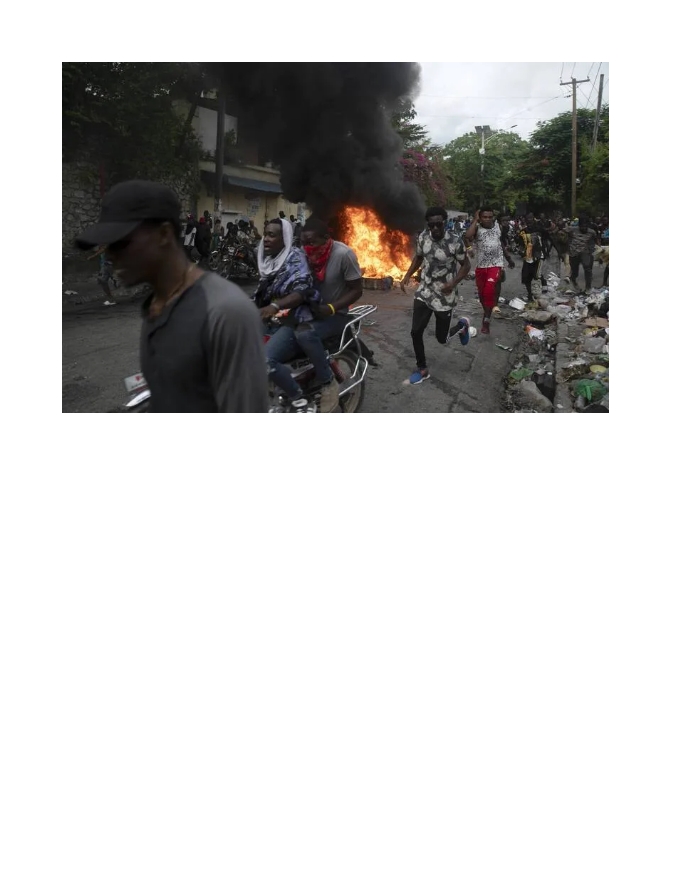After protracted reluctance by the international community and fatigue of the Haitian population,
brought on by the sordid history of past international interventions, the African nation of Kenya
agreed to lead an intervention force to assist Haiti out of its current crisis. In a Kenyan Minister
of Foreign Affairs and Diaspora statement, Kenya has pledged to deploy 1,000 police officers to
help Haitian police restore order in the country and protect strategic installations. The Kenyan
diplomat asserted that at the request of the Group of Friendly Nations in Haiti, his country has
agreed to lead a Multinational Force in Haiti, because Kenya supports people of African descent
around the world, including the Caribbean, and aligns with the African Union’s Diaspora Policy
as well as Kenya’s own commitment to Pan-Africanism. Once a UN mandate is obtained and the
Kenyan constitutional processes allow it, the force will help the embattled island nation. In the
meantime, an assessment mission by the Kenyan Police Task Force is planned in the coming
weeks to evaluate, inform, and guide the mandate and operational needs of the mission. Last
Saturday, US diplomat Anthony Blinken declared that progress is being made in the deployment
of an international force to Haiti, and that soon a public statement will be made.
Furthermore, UN Secretary-General Antonio Guterres welcomed the Kenyan’s initiative to lead
the charge to help Haiti’s police combat gang violence and encouraged other countries,
particularly those in the Caribbean region, to join the effort. The UN Secretary-General valued
Kenya’s decision and reiterated his call to the Security Council to support such non-UN
international operations, especially as there’s been a tepid response since the Haitian Prime
Minister requested an intervention force last October. Though there has been broad support for a
rapid action force to be deployed to Haiti, among several countries, none has been forthcoming
to commit troops until now, nor have they expressed the willingness to lead a deployment. The
US has lobbied Canada to lead, but the Canadians were not fully committed. When asked on
Monday about the Kenyan decision, Canadian Premier Justin Trudeau said he is very happy that
many countries are becoming involved to help. He continued conversations with the U.N. about
what Canada can do for Haiti.
In March, Canada pledged US$75m in aid for the PNH and in October joined the US in
delivering tactical and armored vehicles and other supplies. Also, other countries have been wary
of supporting the unelected administration of PM Ariel Henry, who has said fair elections cannot
be held with the current insecurity, while the country has been without any elected
representatives since January. On Monday, U.S. State Department spokesperson Matthew Miller
said that the U.S. and Ecuador would draft a U.N. Security Council resolution to authorize the
deployment of an international security force to Haiti. The history of international interventions
in the country has left much to be desired. U.N. peacekeepers were deployed to Haiti in 2004
after President Jean-Bertrand Aristide was forced out of power. They left in 2017 and were
replaced by the UN police, who departed in 2019. The Haitian people are wary of an armed U.N.
presence because the country was free of cholera until 2010, when U.N. peacekeepers dumped
infected sewage into a river, causing the death of more than 9,000 people, and some 800,000 also
contracted the disease.
In other news, the Haitian press is mourning the sudden death of one of its iconic figures, Liliane
Pierre Paul, who passed away yesterday, Monday, July 31, 2023, following a cardiac arrest. Ms.
Pierre Paul was the programming director at Radio Kiskeya and a star presenter of Journal 4 è.
She was a committed voice and an excellent figure for freedom of expression in Haiti. Her death
has shocked many across the political and social spectrum. Born in Petit-Goâve in 1953, Liliane
Pierre Paul spent more than 35 years defending the country’s human rights and freedom of
speech. Her career was marked by an unwavering dedication to democratic values and her
commitment to informing the Haitian people independently and objectively. This multi-award-
winning journalist was one of the members of the Haitian intelligentsia who were sent into exile
by the Duvalier dictatorship after November 28, 1980. After years of persecution from the
military juntas that came along, Ms. Pierre Paul, together with the late Sonny Bastien and Marvel
Dandin formed Radio Kiskeya in 1994; which became one of the earliest independent radio
stations in Port-au-Prince. Thanks to her charisma and passion for journalism, Liliane Pierre Paul
has become one of Haiti’s most famous and popular personalities. Its news edition, Journal 4 è,
was followed daily by thousands of listeners who considered it a reliable and essential source of
information. Beyond her role as a journalist, Ms. Pierre Paul was also a strong advocate for
Haitian women, fighting for gender equality and for a more inclusive society. Her influence goes
far beyond the media world, and she leaves a powerful legacy of courage, integrity, and
dedication to the cause of the less fortunate. Her departure is indeed a huge loss for the Haitian
press and the society at large. Her unwavering commitment to freedom of expression and a better
Haiti will forever be remembered, inspiring future generations to continue her fight for truth and
justice.
Finally, the much talked about adventures of the women’s national team, the Grenadieres, ended
this morning at the Perth Rectangular Stadium in Perth, Australia, when they failed to advance to
the group of 16. The ladies conceded four (4) goals, including three (3) penalties in each match.
The score line appeared to be similar, with a penalty in each of their matches against England,
China, and Denmark, respectively, and a second goal by the Danes in added time sealed their
fate. The Grenadieres failed to score a single goal to end their second participation in a world cup
and are out of the tournament.
Dela Harlley

